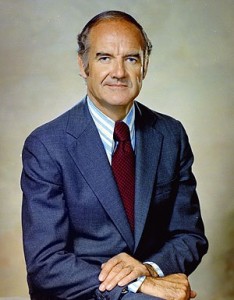The long-time amiable journalist, Katie Couric presented a compelling argument about the causative factor in the increase of the country’s growing waist size and chronic conditions such as heart disease and diabetes in the 2014 documentary Fed Up. The focus of the movie shifted away from the conventional wisdom that lack of exercise and an unwillingness to pursue healthier habits as the causes of the obesity epidemic.
Instead, it almost exclusively tied the obesity epidemic to the ubiquity of processed sugar that remains in 80% of the country’s 600,000 food items, while taking a critical stance on the political sway the food industry has on the U.S government.

Couric, narrator for ‘Fed Up’ has chronicled the obesity epidemic for years.
In the beginning of the film, Couric proposes the question, “What if our approach to this whole epidemic has been dead wrong?” A rhetorical statement I would venture to say, since it was posed shortly after she cited that 95% of Americans will be overweight in 20 years. The film serves as an insightful medium for nutritional guidance, a topic that is largely misunderstood by most people in this country because of the misinformation that has been purported about proper nutrition over the years. This is evidenced by the significant increase in heart disease, diabetes, and obesity after Senator George McGovern produced dietary guidelines in 1977 — a guide that was created to reduce the aforementioned health concerns.

Senator George McGovern intended to resolve the issue of the increase in obesity in 1977 to no avail.
The film queries concerns about the integrity of the food industry and how the motive for profit can compromise the health integrity of the food they manufacture if it means more profit. In response to the dietary guidelines of the McGovern Report and the misleading notion that the macronutrient fat was what caused someone to be fat, food companies began to market their products as ‘reduced fat,’ ‘fat-free,’ and ‘natural’ to convince consumers that they were making healthy nutritional choices. Needing to sustain the taste of these food Items with the reduction of fat, sugar became the fortifier to assuage the taste buds of the American eater.
Nutritionist Michael Pollan explains, “We’re eating way too much sugar. There’s a sugar arms race in the supermarket where, you know, the yogurt now has to compete with the soda for which can deliver more sugar per ounce. And the yogurt’s ahead right now.”

Michael Pollan, acclaimed nutritionist, author of “In Defense of Food,” and advocate for cooking real food at home.
Fed Up portrays the dynamic politics plays in our country’s food sources. The film demonstrates clear-cut instances where public health became an expendable concept like when Ronald Reagan’s $1.8 billion cut in the school-lunch program made way for the food-industry’s infiltration into the schools with processed junk that famished countries in Africa wouldn’t even eat.
Fed Up does a great job illuminating an issue that has hit this country hard and will likely to continue hitting even harder. Its point about obesity not being simply related to caloric intake and caloric expenditure is valid. So to narrow it down to lack of willpower and laziness is misguided. The film, however, seems to make the same mistake of narrowing the obesity epidemic to a singular issue — sugar consumption — and while doing so they undermine the importance of physical activity and the control an individual can enact on their own life. There are many factors that could potentially lead to obesity including genetics, overeating, the types of food consumed, physical inactivity, and the advent and ubiquity of temperature controlled environments.
If there is any singular issue to determine the root of the obesity epidemic it’s our culture. Think about it. What if we as a culture held our politicians accountable for jeopardizing public health to serve special interests? What if we as a culture held physical education in our school as a priority rather than putting it on top of the chopping block whenever the tide of budget cuts rolls through? What if we curtailed our wasted minutes we spend on our smartphones? What if schools and parents didn’t constantly fear for their kids’ safety and take away balls at recess, or put kids on an iPad instead of letting them run around on their own? What if we gave our employees an hour in their work schedule to engage in physical activity? What if we didn’t rely on food marketers to tell us what is healthy, and did the research ourselves to figure out what is healthy?
We’ve evolved into an on-demand culture where physical labor in our daily activities is now voluntary for the most part. It’s a sedentary culture that no longer has time to cook real food and to exercise. The genetic disposition to be fat is similar to the social disposition to be poor. The degree of difficulty to navigate towards a more stable body composition and income is much harder to attain than someone who has no to little exposure to this disposition. It becomes much easier to give up and not try when a much greater effort is being put into striving for health, or a quality wage. At the end of the day the attitude of defeatism and powerlessness is not helpful. We need to become less sedentary and stop relying on the food industry to educate us on what is healthy and do it ourselves. Otherwise our approach to this epidemic will have less to do with Couric’s perception of it being wrong, and more to do with what Albert Einstein would consider to be insane.
